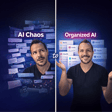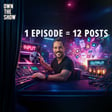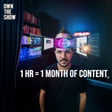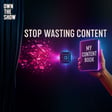Become a Creator today!Start creating today - Share your story with the world!
Start for free
00:00:00
00:00:01

What It Means to Be AI-Driven in 2025
In this AI marketing podcast episode, Dan Sanchez joins Mike Montague on the Human First AI Marketing Podcast for a high-energy, insightful conversation about how AI is redefining what’s possible for marketers in 2025. Dan shares his personal journey from burnout to breakthrough by embracing AI tools, and he unpacks practical frameworks, advanced prompting strategies, and the future of automation for small marketing teams. The episode is a deep dive into how marketers can do more with less—without sacrificing creativity or humanity.
My Favorite AI Tools
- Tella (AI screen recording app I record all my solo episodes with) - https://danchez.com/tella
- High Level (My all in one marketing platform) - https://danchez.com/highlevel
- Zencastr (Best AI podcast tool) - https://danchez.com/podtools
- n8n (my favorite AI automation tool) - https://danchez.com/n8n
Resources Mentioned
- Element451 CRM - https://element451.com
- Animatrix (Matrix prequel short films) - https://www.imdb.com/title/tt0328832/
- "Your Music and People" by Derek Sivers - https://sive.rs/ym
- Avenue9 AI Marketing Services - https://avenue9.com
- Dan's AI Fundamentals Course - https://danchez.com/courses
Timestamps
- [00:00] Introduction and the state of AI adoption in marketing
- [02:24] Why AI is more than just efficiency—it’s innovation
- [04:58] Dan’s turning point: financial struggle and an AI awakening
- [07:46] The lack of good AI education resources and how Dan filled the gap
- [10:05] Advanced prompting strategies: chain prompting and edits
- [12:57] AI-generated images and the thumbnail dilemma
- [15:36] Is AI the considerate choice for customer service?
- [19:30] Human vs AI in support: What’s actually more helpful?
- [25:29] What marketers are missing: Thinking in systems
- [29:02] The value of custom GPTs and automation in your workflow
- [30:38] Children’s books, personal branding, and AI as a creative tool
- [31:30] Utopia or Matrix: Predictions for AI and human behavior
G816nkWtdgFOeFsDOKc4
Transcript
00:00:00
Speaker
Welcome back to the AI-driven marketer. I'm Dan Sanchez. And today I'm syndicating an episode where I was a guest on the Human First AI Marketing Podcast with my friend, Mike Montagu.
00:00:11
Speaker
You could tell by the name of this podcast that it had a lot to do with being human first in an AI-driven world. And we had a fantastic conversation, went over a ton of different topics, including my story a little bit, but also ah what you could do to be AI driven, what it means to be AI driven today and what you could be doing in order to still keep that human connection, that human connection.
00:00:33
Speaker
touch, if you will, because that's becoming a bigger part of marketing, as a lot of things become increasingly automated, as things become kind of generic, as people don't really learn how to leverage AI well, and they're just getting chat to crank out a lot of content for them.
00:00:48
Speaker
So how do you keep that human edge and AI driven world and still be able to leverage AI to do all the nice things that it can do. So go follow Mike over at the human first AI marketing podcast.
00:01:02
Speaker
And enjoy this episode with me as a guest.
00:01:10
Speaker
Welcome back to the Human First ai Marketing Podcast. I'm your host, Mike Montague from Avenue9. Avenue9.com is the website. and My guest this week is Dan Sanchez, also known as Danchez, hashtag Danchez.
00:01:23
Speaker
And that is his website as well. And he's the host of the AI Driven Marketer Podcast. So if you're not subscribed to his podcast yet, Check that out wherever you're watching or listening to this one.
00:01:35
Speaker
And Dan, I'm super excited for the discussion today because i think we're doing very, very similar things from completely different angles. And you've been doing it a little bit longer than I have, but I'm excited to dive in and nerd out about AI marketing.
00:01:51
Speaker
So I guess the first question is, what does being an AI-driven marketer mean in 2025? Is it possible to be a marketer without being AI-driven?
00:02:02
Speaker
Oh, of course, of course. And there's many, most marketers are still not AI driven at all. Like they might've logged into chat GPT once, but they're not using it on a meaningful way in a daily, weekly, even monthly basis.
00:02:12
Speaker
ah That's, that's, I think the majority of marketers, I'd say over half. I don't think we've even crossed the ah cross the chasm, as they say, like from wow early adopters to the early majority, just for marketers, like it let alone the rest of the society. I think this year we'll probably see that cross crossing of the chasm for marketers.
00:02:31
Speaker
And I define that as like over half or a pretty large percentage of marketers are now adopting AI in a meaningful way. And that's kind of what I think of ai being AI driven, using the AI tools in a meaningful way on a daily basis.
00:02:46
Speaker
to extend what you can do as a marketer, like a Swiss army knife. Like you can have a normal knife. You're like, oh, it's got a blade, but a Swiss army knife house has multiple tools. And when you start adopting AI, I think I just saw this meme that was hilarious. is I scheduled it to post on my LinkedIn, but it was kind of like vibe marketers or um marketers who don't know how to market using AI coders who don't know how to code using AI vibe startup and they're joining forces. um And everybody knows this is going to be a failed venture.
00:03:15
Speaker
But I'm like, yeah, but what happens when you actually put an experienced marketer with AI or an experienced coder with AI? Well, now we're talking about some superhuman stuff, right? Like it's almost like it gives you superpowers to do so much more with so much less. And it's not just about cost efficiency. You can do things that weren't even possible before.
00:03:34
Speaker
You can innovate in new ways. In fact, that's like, I love it. Like i remember, you remember when like digital marketing was becoming a thing? Uh, yeah, yeah. I'm old. People were like, be on the wave of that too yeah Facebook, people were like, businesses were like, I don't know what to post on social media. Like, why would people want to know what I eat for lunch?
00:03:53
Speaker
We hadn't even figured out, like just post helpful content according to what you do for the people that you post. Like we hadn't figured that out yet. It's so like, there's still this like huge wave of like, we haven't even figured out all the different ways we can use it. You're like, okay, yeah, we can use it to write some social content in a blog post, but I love being in this new space. And a lot of, I think people like you and I are like taking advantage of kind of the newness of it and kind of exploring this uncharted map and just finding new territory in order to like learn and explore and like organize a little bit. I that's why went all in on it is because I think that it is a continuation of what we've been doing our whole careers here that,
00:04:32
Speaker
And when I saw two years ago that I could do what was taking me a lot of time and effort as a full time marketer for a ah corporate entity, i was writing about 2000 words a week or sorry, 10,000 words a week by myself, which is almost a full book.
00:04:48
Speaker
yeah of just blog posts and social media posts and white papers and, you content galore. And i was like, Oh, I can do this in a 10th of the time if I do this right.
00:05:02
Speaker
And same thing, podcasting. I've been podcasting for like 10 years and what I used to do myself that would take four or five hours a ah show. And then I outsourced overseas and stuff to save myself time and and money as the show grew. And now it's, well,
00:05:18
Speaker
wait, I can do all of this in about 15 minutes to an hour after the show and have it better than I've ever had it before. And there's things that humans couldn't do, like tag keywords and stuff that were, it was a really painful, really kind of scattershot process.
00:05:36
Speaker
Um, is a game changer for me. And then when you talk about repurposing content, and now I can take that podcast and turn it into everything that I need to fill the entire rest of my week in a marketing funnel and do that in less than a day. It was like, have to do this for other people because I doing it for one company seems seems silly. Now I would have to really get creative about what I could due in a week if I'm doing my job in a day.
00:06:01
Speaker
So that to me is really exciting. Why did you go all in a couple of years ago? um It was because of pain. I was having a major problem. You know, it's nothing like pain and brokenness to like force you to like think, think about what's next.
00:06:16
Speaker
I was solo had been, I'd been let go from a startup. um They hired me to grow an audience and then decided it would be better to like, uh, like acquire an audience instead.
00:06:30
Speaker
And we parted ways. And so I went solo and a lot of people were like, Hey man, you got the chops. You need to go. But you know what? Transitioning ah like all of a sudden is still really hard.
00:06:40
Speaker
I thought I had a good one. I did everything backwards. Like I did the stupid thing where you like launch a course first, bad idea. Don't launch a course for us. Look for better. But yeah, And so I was late. I was just kind of it was like December. it was this, this started in July. It was December of 2023.
00:06:55
Speaker
Luckily, the one cool thing about that startup is they were super early. As soon as chat GPT hit the scene, the CEO was like, this is it. We, this is all we're doing from now on. And so it was like December, like, so spring, we were cutting up with all kinds of marketing resources about AI. I was seeing what they were doing and product dev with AI.
00:07:13
Speaker
And they're still one of the most cutting edge companies when it comes to implementing AI into their tech stack. It's a element 451. ah Great product, man. Cool. It's a CRM focused just on higher ed. And I had been in the higher ed space.
00:07:25
Speaker
And so they had something really good going on, still do. um But because of that, I saw, I think I was forced to really reckon with what what ai could do earlier. And I was getting more familiar with like super prompts and chain prompting and how you could really get ChatGPT to work for you.
00:07:41
Speaker
But I still didn't see the writing on the wall. Not until December after multiple pivots of my own personal brand and my service. I didn't know what I wanted to be when I grew up and I was struggling in December. yeah And i was like, i was struggling to just make like buy Christmas presents for my kids, but still kind of making it.
00:07:57
Speaker
You know how it is when you, if when you first go out on your own, there's like this period of like desperation. I feel like everybody has to go through. That was my period of desperation. And I was like, screw this stuff. Like I've got enough marketing stuff that I can do is I'm a generalist. I could do a lot of this pretty well ah that I can make it, but I need to find the thing.
00:08:14
Speaker
What's the thing going to be? It's obviously not audience growth. That's what I had been focused on. Uh, that wasn't working podcast. I didn't want to get into podcasting because that's where I just come from at sweet fish. And I was like, what's going to be next.
00:08:25
Speaker
Um, what's, what's the thing that Gary V is not even really pushing hard on yet. I'm like looking at all the options. It's not a platform. I'm like, it's gotta be this AI thing. This is the thing. And the more I thought about it, the more I'm like, this is going to take over everything.
00:08:39
Speaker
And then I went, i'm like, well, let's, let's start educating myself. Let's go read some books, go find some podcasts. There weren't any, there were no books at that time. Um, cause it was still brand new. All the, all the AI books out there were based on old AI.
00:08:51
Speaker
not Not good. um There was only a handful of podcasts. like That's how I felt. five And none of them are all small shops. 2010 to 2015, was really getting into LinkedIn and I was like looking for a LinkedIn book for salespeople.
00:09:09
Speaker
And there wasn't one, it was all about social media marketing and just yeah get a ton of followers, join 50 groups, add at all the people you can. And hopefully somebody buys from you someday was the sales strategy.
00:09:20
Speaker
And I was i like, I need to write this book. I need to go all in on this. And it hasn't been since then that I've really felt that And I felt the same way about, you know, websites. Obviously, i started doing that in high school in the but late 90s. We're like, oh, everybody's going to need a website. And I can't get people to stop asking me to build one once they know you can do it. You're like, OK, everybody, you know, my uncle, everybody's friends, you know, want me to build them a website.
00:09:47
Speaker
And I was like, OK, this is cool. And it had been a while. it had been about 10 years now. yeah Where it was kind of even the pandemic you think would have shaken stuff up, but the remote work was kind of just what I was already doing. I'd already been working remotely for five years. so Didn't feel like a real shakeup. And then when ChatGPT hit, it was like, oh, no, this is...
00:10:07
Speaker
the game changer. This is the one that's going to switch the game and and change everything for everybody. So I'm really excited about it. I'm excited to to dive in here more with you. I got a couple of ah deep questions. First, let's take a quick sidebar. You mentioned chain ah um prompts and other things.
00:10:26
Speaker
Do you prefer one long? I think you do. I've listened to your podcast a lot. One long prompt with a lot of detail and context, or do you fight back and forth and do several short... prompts to clarify and and refine your work. What's your, yeah actually do both.
00:10:43
Speaker
I think chain of thought, sorry, not chain of thought. No, that's, that is it's, um, No, it's not chain of thought. That is a specific style of prompting. What I'm thinking about is chain prompting is really, really important.
00:10:57
Speaker
um And it's one of the few skills I don't, I think I need to do a whole episode on it because I don't think people get it. You're like, that's, this is the magic for getting into really the power of custom GPTs is thinking about, thinking about multi-step things where you don't do all of it all at once. You're like, Hey, do this, then do this, then do this. That becomes more powerful.
00:11:15
Speaker
starts laying the way to automation too um yeah so chain prompting uh but i also like to give a lot of not like structured prompts not like the prompts we were doing last year where it was like all this like stupid stuff and like trying to pretend you're this and do this it's like super structured you're like that's garbage just give it more context so i usually just push record dictate i'm like hey chat gpt here's the problem And then I give it the context like I would to you if you were the expert helping me solve my problem.
00:11:43
Speaker
And then you and then i I might let it solve it right there. or I might finish it, my context and be like, OK, before we get started on it, ask me a few questions that would give you more clarity. If it's a big enough problem, I usually do that.
00:11:54
Speaker
And then we go back and forth. So you see, I'm using I'm thinking through what this conversation is going to look like before I even start the conversation. Yeah, in my career, i've I've been lucky enough to work with a a marketing team and stuff and have new assistants and things. So I just think about it like that. It's like, hey, if i had a that's it if I had a human sitting here that's ah a novice marketer, doesn't know what I want, what context would I have to give them? So they delivered a good product, right? Here's here's what I want.
00:12:20
Speaker
Here's what you need to know. Here's what the audience is. And here's some of the choices that I would make before you even get started. I know that I want this, this, and this in the result, but feel free to give me suggestions. If you can do better than that, give me some other options and stuff. And then like you said, let's go back and forth. I wouldn't expect a ah human to get it ah a hundred percent right without any edits and stuff the first time. So let's fight about it. Let's argue, let's collaborate, you know, plus one at each other as we go through and then get to something. And What I'm trying to do less of is go back and forth.
00:12:52
Speaker
um Because if you do go back and forth too much, it'll start getting confused eventually. So something I've learned, I've been picking this up from Nicole Leffer on LinkedIn, but she's a huge fan of like, if it doesn't get it right, go back and edit your prompt, go hover over it. There's a little arrow. There's a little edit button. You could do this with Claude too.
00:13:10
Speaker
And just go and edit your original prompt so they can then give it give you the right answer. That way as you continue the conversation, you don't have like multiple versions of the thing. You have the right ones, but sometimes you don't want to try to get it all done in one.
00:13:22
Speaker
Like there's a reason you want to have a conversation, but don't, don't be like, oh, that's not what I wanted. If that's true, just go and edit your prompt and try again and then go back down. ah Good. I think that's interesting and some really good tips. Let's nerd out on one more just to give people some in-depth stuff. And if we lose people, we'll circle back. And I promise in a minute, we'll talk about the different types of of ways you can use AI in marketing. But The one thing I've also noticed by watching your content and and what you do on the podcast is you seem to be good at images and you know particularly the thumbnails and AI generated stuff.
00:13:59
Speaker
And that's one where I just, I know ChatGBT released a big update and stuff. I still, whenever I try and change something, it ends up messed up. And the more I try and refine it, the worse it gets. And then I go, you know what, by now I could have just found a stock image on Envato and yeah and continued on with my work.
00:14:16
Speaker
Do you have any tips or or what's your workflow for making good images? I'll tell you, I've wanted to do an episode on it, but I haven't because it's probably the most painful part of my podcast right now is the images. Like it's easier for me to record the episode than it is for me to knock out the image. Like it literally takes me more time to make that one freaking image than it is for me to do record the whole episode.
00:14:40
Speaker
That's how long it takes. Well, that's why just defaulted to a thumbnail template like the old days. And we'll knock out the background on your profile photo and I'll call it good. But you do some stuff. I'm thinking about it. But right now I'm using a combination tools. Mostly Google's image effects because it's just way faster. I love chat GPT's thing, but it doesn't quite capture your likeness.
00:14:58
Speaker
If I could just do a character, which I was doing with the little TV head dude. Right. But my LinkedIn audience was like, I asked them, I'm like, hey, like, should I be doing me or the TV head? And I was like, cross my fingers, please say TV head because it's so much easier.
00:15:11
Speaker
It doesn't have to be consistent. They're like, we want to see you, Dan, personal brand, Dan. We want Danchez all day. I was crap, crap. Okay. You're right. I'll do me. But it chat GPT can't quite capture your likeness. So I'm still experimenting with like face swap tools, but generally I'm spending an hour and a half in Photoshop manually doing that crap.
00:15:35
Speaker
That sucks. Uh, me too. Not an hour and a half though. I try to keep it like 15 minutes or less. Like I said, you use, use a template. The thumbnail is too important though. So I still put on. But they are on YouTube for, for sure. And, and you're doing much better than me on on that. So, uh, it could, it's worth the effort. Sometimes it's worth the effort. and I think that's where we are in the world of AI. So the way I describe it, um, and feel free to steal this because, um,
00:15:59
Speaker
the One of the funniest quotes I've ever heard, they were interviewing a guy at Yosemite National Park about ah bears getting into the trash cans and stuff and how they could make a bear-proof trash can. And the park ranger said, well, it turns out there's a considerable overlap between the smartest bears and the dumbest humans.
00:16:17
Speaker
So if we make a bear-proof trash can, we make a human-proof trash can. Then people leave the food out. next to it and the bears come in and eat the food anyway. So like there's there's no things. And that's kind of where I feel like we're at as we talk here in 2025 about AI is there's a considerable overlap between what AI can do better than humans and what humans can still do better than AI. And they're there's limitations to it. And so I think we have to make a lot of judgment calls about, is this still a human thing?
00:16:46
Speaker
Is this something I should automate, could automate, should definitely not automate? And you have some cool ways of thinking about it. You don't have to go through all five different types of AI marketing. But when you think about that question of like, definitely in 2025, if I'm a marketer, I should 100% be using AI for this.
00:17:06
Speaker
Maybe it's a judgment call, depending on your skill set or or your needs for your business. And then definitely do not use AI for this. What what do you think falls into those buckets? Um, you know, it's really makes me think of like one of my top two favorite marketing books of all time. And it's not, it's obviously most market, most people, most marketers favorite marketing book is never a marketing book.
00:17:27
Speaker
Um, but one of them, let me get it. Where are you? Oh, you gotta find it. too bad I usually have it on my bookshelf right there, but it's missing. It's a purple book from Derek Sivers, right?
00:17:40
Speaker
Founder of CD Baby. He's written a lot of fantastic books. The guys just get it writing. But this one's called. Oh
00:17:48
Speaker
my gosh, I'm blanking on name. This is really embarrassing. ah I'm sorry. Well, we'll use AI to cut it in later.
00:17:57
Speaker
I don't know his. Usually I'm good at that.
00:17:59
Speaker
Your music and people. Your music and people is from Derek Stowers. never heard that one. Get it. It's amazing. This book was written from a creative because he was a musician about essentially business and marketing to the most romantic crowd of all time.
00:18:17
Speaker
Musicians. Right. And they're like, ah I don't want to give in to the man. I don't want to do marketing. I don't want to like do this stuff. I just want to play my art. I just want to do my music. Right.
00:18:27
Speaker
So it's this whole book about how good marketing and clear communication is actually the most considerate thing you can do when it comes to building a relationship with your audience.
00:18:38
Speaker
In fact, as a human first AI marketing, like this would be a great book for your audience because it's like it humanizes and a actually philosophically dives into why it's important to have good marketing.
00:18:50
Speaker
And good marketing is just an extension of your art. Of course, as marketers, like we've known that we feel that a lot of us came from creative backgrounds. I came from like fine arts to graphic design to mark to marketing.
00:19:01
Speaker
Like I was a little bit more romantic than I'd like to admit. and Right. um I sold that right away. Yeah. So when it comes to implementing AI for marketing, you have to, kind you have to think about it. Like the way he puts it in the book is like, what's the most considerate approach you can take? Mm-hmm.
00:19:21
Speaker
Does this cause them less pain or more pain? Like, does this help them? Does this serve them? Does this help educate them in a way to help you help them buy your product, which is what they need or or ah helps them? Assuming you have a good and really useful or entertaining or valuable product, um how can you be more considerate and less of a pain for them?
00:19:42
Speaker
So if you apply that kind of thinking to it, then your AI marketing efforts will help. So where can AI be more of an assistant to them? Don't think about it just how it can help you.
00:19:53
Speaker
How can it serve them? um I used to work in a ah ah college and... We always had a problem not being able to handle inbound calls and man the site chat enough hours because I had a bunch, i had a huge student team.
00:20:07
Speaker
I mean, I probably had 23 students working for marketing and then the call center and the admissions department had another like 15, 20 students managing phones, usually doing outbound um for calling leads that had come in or applications or whatever.
00:20:20
Speaker
um But we, I, the people had questions and I can never field enough of those phone calls, especially when the students were off, which is when we weren't working, right? Huge problem. I wish we had these tools back then so I could have an inbound phone operator, AI voice answering basic questions and scheduling appointments.
00:20:38
Speaker
like that would have been amazing. It would have been amazing to have a site chat that's educated on the whole website, answering basic questions. Cause sometimes people don't want to like search or really navigate as much as you try to make the site intuitive. Sometimes people don't have a hard time finding things.
00:20:52
Speaker
Sometimes they just want to know what the status of their application is. Having AI be able to answer those questions um is extremely considerate. You might think of it as like, oh well, that's not very human. I'm like, yeah, but like, does the user like it?
00:21:08
Speaker
I don't care that I don't have to talk to a human when I return my Amazon package. I like that there's a bot that helps me figure out how to get this resolved and that my my money gets refunded and I send the thing back. That's all I want.
00:21:20
Speaker
sometimes Right. That's what I was going to highlight there in what you said is it type depends on the type of question, right? There are things where if I'm completely confused and I need advice on on something and I don't even know what my problem is, I need to talk to a human. I want to be able to get a hold of one. But In order to have the bandwidth to do that, there are other times where I just want to check the status of this package or I need some information.
00:21:44
Speaker
I don't want to sit on hold for 30 minutes, talk to somebody who can't find it and solve the answer or transfer me to another department and stuff and be a mess in ah a phone tree to get a small piece of information or to get something updated that I could have done myself online. And we've all been there when we're trying to change utilities or or move or something. And you're just like, wow. why can't I just go on and just update my address and move through? Why do i why would i have to talk to a human being for this? I think those are the things, like you said, if you use that framework of what questions can we answer? What people, if they already know what the question is, we can give them the answer much faster with AI and a chat bot or ah a voice chat.
00:22:25
Speaker
But if they don't know the right question to ask or they have a problem to solve, how can we route those to a human to be more generous and and help them? Yeah. and Maybe you're a solopreneur, but the ability to have like an inbound call machine doing a lot of the basics for you is huge because you would you would have never been able to apply that level of service before.
00:22:45
Speaker
Now you can. and and a lot of local businesses, my gosh, I have a friend who's a chiropractor he's like, man, maybe I need to hire someone full-time to just be a receptionist just to handle inbound calls because I can't answer calls while I'm cracking someone's back. you know I'm like, yeah.
00:22:59
Speaker
I'm like, you could, but that puts a lot of pressure on your business financially to do that. And maybe it's the more human thing to have a human answer the phone call, but I'm like, Hey, I can do that pretty dang well and just book appointments for you and answer basic questions.
00:23:14
Speaker
So don't know. People argue like, well, right now we're not hiring humans, but I'm like, I don't know. I think there will be, and i'm still not sure. I'm still so out on whether we'll create have like,
00:23:27
Speaker
lost jobs or more jobs or how much, how much will be which way, but i don't know. I think AGI is the the horizon we can't see past. So once AI is smarter than humans, I think the jobs become fewer and and fewer. In the meantime, there's a lot of people that need to build infrastructure. You know, I'd get into robot repair if I was a teenager right now, because I think mechanics and and engineers and computer engineers still going to be valuable for quite a long time. But yeah,
00:23:58
Speaker
What you were saying there is i think there are ways to do this with the right heart if that's what you're you're trying to do, right? If you're a chiropractor and you can say, you know what, if you just want to set an appointment,
00:24:11
Speaker
talk to Jenny, my my AI assistant and book the appointment or use the Calendly link and and stuff like that to save yourself a ton of time. If you actually wanna get ahold of me and you have a problem with your back or a medical question or something else, then press zero, leave a message and a human will get back to you as as soon as humanly possible.
00:24:31
Speaker
But I think there are ways to like give people those options. To you want to try and solve it? ah You choose. Or we do you want to talk to a human? There are things that you don't want to tell a ah human, right? That are are private things or or awkward questions or embarrassing. And so yeah maybe you try AI first with with those.
00:24:52
Speaker
As far as a marketer, though, want to pull it back to marketing and then we'll we'll close with some fun predictions about the AGI that we just mentioned. um When you think about marketing, I kind of put these things in a few buckets that you have as well, which is there's a whole lot of lot of stuff that humans can't do, like automated analysis, data reporting. We just we can't crunch thousands of numbers and and data points.
00:25:16
Speaker
There are some things in content and production that that we can maybe do with ai but then there's some stuff that would take us a massive amount of time, like personalization and generating...
00:25:32
Speaker
ah just like custom presentations or or graphics that we were talking about and PowerPoint presentations, we were both nerding out before we hit record, was one of the things that probably took me the longest amount of time to do. Because I do a lot of public speaking I work with a lot of salespeople that are doing presentation decks or I'm helping them perfect their go to market presentation decks and stuff.
00:25:55
Speaker
And that just takes forever to choose every image, correct every font, perfect every word on a slide. And if you can get me 90% of the way there with AI, that just saves me so much time that allows me to work on the important things.
00:26:10
Speaker
So again, we kind of look at these buckets. Are there anything you think maybe marketers are missing or there's a common misconception about that that you think we should correct?
00:26:21
Speaker
About AI marketing? Yeah, like what's the what's the biggest miss for marketers right now? And where if they leveraged AI, they could really methods. people listening to this show, you're educating yourself on AI. So you're probably beyond the beginner user. Like you're probably paying for chat GPT, which is a mile marker for for me. Like not paying, paying.
00:26:42
Speaker
You're probably paying. And I think the thing that most marketers don't take start to think about is how to think about things in systems. Marketers are usually very like, They're almost most marketers are coordinators more than they are strategic marketers.
00:26:55
Speaker
They're just coordinating stuff. And I think where most marketers miss it, and I don't know what it was in me, I think it is the fact that I like I wanted to be an artist. I wanted to be an electrical engineer. I just wanted to do a whole bunch of things when I grew up.
00:27:06
Speaker
Um, it's the electrical engineer part of me that was like thinking in systems. Maybe it's because I'm lazy and I hate doing things more than once. Um, but I try to think about like, what's the input that like everything we do has a system and a process, whether we know it or not.
00:27:20
Speaker
And it's amazing how many marketers I sit down and be like, well, you write case studies. Cool. Well, what, how do you do that? Okay. Well, you have a process there. You do an interview, you analyze the story in it, you break it apart, you turn it, you write it, you draft it, then you publish it. Right.
00:27:35
Speaker
Like AI can help you do that. You just have to break it down step by step. That's why i keep emphasizing this, uh, chain prompting, like have AI do it step by step. Don't try to do it all at once, but have it walk through the process with you and then start getting it to think in a system, then start automating it by building it into a custom GPT. And then once you've done that enough times, start using tools like make.com or NAN to like automate it even further.
00:28:00
Speaker
Yeah. And you'll start to find that you can do so much, so much faster. But I think that's where most marketers are stuck. They're still doing AI in a manual way. Start thinking about how to automate it.
00:28:12
Speaker
You don't have to automate it fully because the automation platforms are honestly kind of a pain to build anything with right now. um But thinking in custom GPTs, that's the step that most marketers are stuck at right now.
00:28:24
Speaker
And i i but I have to keep emphasizing it because I want to see more people break through that barrier. Yeah, it's probably one of my most valuable go-tos are the custom GPTs because as we were talking about with the prompts, it's hard to give that much context every single time you do a prompt. If you're starting from scratch and they just increased...
00:28:45
Speaker
ChatGPT's memory and stuff of previous things that you've done. But in a custom GPT, I can give it all of the data of my my brand guidelines, my messaging, you know my ideal personas and and target markets and my unique value proposition.
00:28:59
Speaker
And then every time I ask it to write a blog, it's going to consider that context. That saves you a ton of time and effort. of trying to do that every single time. And then I still have to think about what I'm creating and I still have to take that output and put it somewhere else, you know, and the with the copy and paste. So it's not um automated in the sense that like, oh, it's Monday's blog day. I'm just going to go, you know, see what blog ChatGBT posted for me because I've already automated.
00:29:28
Speaker
everything. i don't I don't think we're there yet, but we can save ourselves a ton of time if we really dive into these tools and and figure out how to make them work. And I love that you're helping people do that with the AI-driven marketer podcast. You're certainly helping me do that.
00:29:42
Speaker
ah People can follow you on YouTube. You can go to danchez.com and subscribe. There's also some great courses and books on there. The children books were fascinating. Dan, I wanted to ask you about that before we uh, wrap up here.
00:29:56
Speaker
What made you do that? And I feel like there's going to be some birthday presents in my nieces and nephews. I had a friend getting into making children, nonfiction children's books. And I was one of his, I was probably his second customer. He was a, he was a really good children's book author himself and had toured around and knew what made kids like books.
00:30:16
Speaker
So he started doing it as a service and James Carberry's sweet fish, Like I think overpaid him for his first one. And then he's like, Oh, just make one for Dan too. So that was, uh, I want to be a marketer. When I grew up, I worked with Timmy on creating that book.
00:30:30
Speaker
Um, we worked on the story together. He illustrated it cause he's the illustrator. And then later I wanted to get into, I wanted to become more known for audience growth. So I was like, huh? The first one was more of like, I'm going to give this as a gift to marketers. Um,
00:30:41
Speaker
Um, as, as a way to, I don't know, like if I want to build a relationship with other marketers, this is a tool in my tool belt. Cause like a kid's book is, it costs like what, six bucks to print on Amazon for my, for me, like maybe I market up a dollar for everybody else that buys it or whatever. But like, like it's, it's an interesting gift you, I can send to people now who who are marketers who have kids. Right. Cause how do you explain that to a kid? It's really hard.
00:31:04
Speaker
Um, so that was why we did that one. And then the other one was more of like a positioning play rather than writing a whole book on it. It's interesting way to start with a kid's book. Now you can have chat GPT do it. And i'm working on a third book called,
00:31:17
Speaker
ah i don't know why I'm blanking on books today. um Captain creative is the, and my AI sidekick is the name of the third book, but I'm having chat cheap. I'm working with chat. GBTs image generator to make it because it's so much better at having continuity between characters.
00:31:35
Speaker
It's not perfect, but it's pretty dang close. So that'll take you a while, but that's a fun project to do. And when you, I think it's another great tip hidden in that is that when you do something even fun for yourself, or once you do a hard project like that, it makes all of your life so much easier because now when you go, you're,
00:31:53
Speaker
You have that skill of creating consistent graphics for the rest of your life or as long as we're doing this, which is my last question. If you had to predict out where all of this lands, what sci-fi movie do you think we we'd end up in? I'm talking like after AGI, maybe like 30 years from now. Do you think people end up with jobs or are we all on the beach while the the robots and AI do the jobs for us?
00:32:19
Speaker
um I think a likely timeline, and this is just based on my understanding of human behavior, is probably going to lead more towards like the Matrix. Don't think of the Matrix where you're like thinking of Neo, but there was a sub-series they did that explained the leading up to the Matrix called the Animatrix, where they animated the prehistory.
00:32:39
Speaker
And in that version, it's not a different version. It's literally just the prehistory that leads to the Matrix. ah AI comes, they build a lot of robots and humans just go to a life of like pleasure and debauchery, essentially.
00:32:52
Speaker
And eventually there's a mistake. The human, the ah so the humans get really mad at the AI because they made it like they something happened and humans die. um The AI wants peace. Humans are like, nah, these are too dangerous. They start killing it. AI starts actually retaliating back and becomes better towards humans. And that becomes, that's what starts the war in the matrix.
00:33:13
Speaker
But like and human behavior left without work is not is not good. I know a lot of people are like, oh, if we didn't have to work, it'd be utopia. I'm like, I don't think you understand how important work is.
00:33:26
Speaker
yeah um i also like that. So that I think that's a possible scenario. I also have like a deep Christian faith. And then it starts to mix in my eschatology of like how that's going to play out in the end. And I haven't really figured that out yet.
00:33:39
Speaker
Yeah. but So I'm like, well, yeah, I think there's a a utopian version that we all hope, which is like a Star Trek next generation where we're exploring, we're doing some jobs because we choose to. And and we have everything provided our safety and and food and, you know, the holodeck to go play a game or or different sports and games and 3D chess that we can do in the in the future.
00:34:03
Speaker
Yeah. That's the nice. I think the combination of people are probably, it comes back to like, do you think humans are naturally good or naturally evil? Which I take, obviously I think humans are naturally sinful or evil, um, deep down. And that's where like the matrix story comes from neck.
00:34:20
Speaker
The star Trek assumes that people are naturally good. And with all the constraints and all the bad things happening to them, we're moved from the equation. You end up with that utopian society of star Trek. So I'm going share, usually I don't share my take as much.
00:34:34
Speaker
I think they messed up the ending to Star Wars. Did you see the last three with Kylo Ren and Rey? So what I think they should have done is because they're in the next generation and stuff is be like, hey, look, I am supposed to be the the Jedi and I came from the the dark side parents and you're supposed to be you know, the, the bad guy here and you came from light side parents.
00:34:58
Speaker
What if we're all just good and bad? What it, why does it have to be one or the other? They should have both just like put down the lightsabers and been like, you know what, we're going to use the light side and the dark side. And, you know, sometimes it's okay to be angry and sometimes you need to chill out a little bit and, and use the force for, for good.
00:35:16
Speaker
And it would have been such a cool ending to the series because, it's kind of predictable and cheesy that if good wins over evil and like and they always said there's a balance to the force. So, you know, that like they're never going to eliminate evil forever.
00:35:30
Speaker
It's not just going to be peace and prosperity after that. And that's kind of the way I think about AI in the future is. Yeah. there's probably some really cool problems that AI will solve and create a utopia for us. And we'd be like I can't believe we have this much food or this much fun in this certain area.
00:35:46
Speaker
And there's probably some problems that are really hard for AI or impossible for AI to solve, like, you know, immortality or something. And so we'll just, we'll always have to deal with,
00:36:00
Speaker
death and pain and fears and worries and, and people trying to cheat the system and other stuff. And that's just something that we won't be able to eliminate from our society.
00:36:11
Speaker
So fascinating. I'm thinking Star Wars. Now you're like, look at those robots. You're like, man, they're really stupid for as advanced as they are. They're actually really dumb considering the AI we're going to have really soon and how good it already is at talking to us. I'm like, why are the robots so dumb?
00:36:24
Speaker
They seemed really smart like 20 years ago. Now you're like, Man, they have dumb robots. They're all idiots. Do you think that's intentional? I kind of feel like that was intentional in the Star Wars universe that we'll probably...
00:36:36
Speaker
have specific like it's a choice they could have given like c3po's voice to r2d2 but he speaks in code because he's a code-based like doing a function of a code-based like they gave r2d2 like the intelligence of like almost like a dog i mean it's smart it figures things out it processes things but i'm like they almost gave them more animal personalities and behaviors than they did humans to endear them to endear that's true lassie probably it's kind interesting choice playing the role of Lassie to like come in and save the day every once in a while, but yeah generally just following along and cheering everybody else on. Exactly.
00:37:14
Speaker
That's great. ah Well, awesome. This has been a fun conversation. Thanks for nerding out there with me as well. We mentioned the website and the podcast, danchez.com, the AI driven marketer, anything else? How can you help us or we help you, Dan?
00:37:28
Speaker
ah If you want to get more into what I'm talking about regarding like chain prompting and how that becomes a custom GPT, I did put together an AI fundamentals course that covers this step by step. And I think it's just go to danchez.com slash courses and it's like the top one on the page.
00:37:43
Speaker
ah But I'm trying to help people understand it. And this really breaks it down step by step, like how to start thinking in this way. And I think it's the most helpful for people, even though I call the AI fundamentals, it's probably more of an intermediate course.
00:37:54
Speaker
A lot of beginners were like, whoa, that was a lot. So it's not exactly one-on-one. It probably should be more of a two Oh two course, but I think that's the way I'm trying to help more marketers level up from just using it as a a back and forth tool to a tool that handles more for you.
00:38:11
Speaker
Love that. And I think we have a cool overlap here. So if you want to try and figure out how to do it yourself, go to danchez.com. If you go, wow, these guys are super nerds. I don't even want to try. I need somebody to do it for me.
00:38:24
Speaker
Go to avenue9.com. We have a marketing agency that's AI powered and and human focused to help you ah amplify your thoughts so that you don't have to learn all the tools and and how to do it.
00:38:35
Speaker
And some strategic consulting as well. If you want to figure out what to do and and then go do it yourself, that's certainly an option as well. Avenue9.com for more information. Until next time, have fun. Keep going, everybody.
00:38:47
Speaker
Bye.










![What’s Your Authority Score? [The 5-Factor Test] image](https://media.zencastr.com/cdn-cgi/image/width=112,quality=85/image-files/630c9f06819f8b3dba5fa460/cfbaccba-f587-45de-a41f-e2c99c15e2a5.png)
![The Audience Growth Engine [Full Framework] image](https://media.zencastr.com/cdn-cgi/image/width=112,quality=85/image-files/630c9f06819f8b3dba5fa460/46b84fd1-e856-4687-9aee-6b4a7e0bc7ff.png)



![The "Dream 100" Execution Plan [Google Sheet System] image](https://media.zencastr.com/cdn-cgi/image/width=112,quality=85/image-files/630c9f06819f8b3dba5fa460/fcd89374-76a4-4e58-a2e3-2bb7ddda4364.png)



